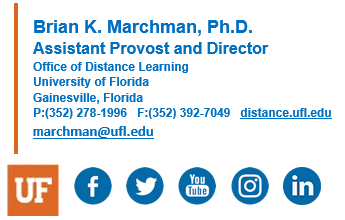In light of moving classes online, a number of students have expressed their concerns about HonorLock’s terms of service and privacy policy. Honorlock is a tool that UF has enabled that records an exam session while allowing students to test at their convenience.
We’ve reached out to the Office of Distance Learning with your concerns and they have responded with the below statement. Any other questions should be directed to the Office of Distance Learning.
Dear Students,
My office understands and certainly appreciates the concerns you have expressed with regard to privacy and information security. Please be assured UF’s solution provider and partner in ensuring academic integrity – Honorlock – has passed a privacy and security evaluation by UF Risk Management and is held to all applicable FERPA (Family Educational Rights and Privacy Act) and GDPR (General Data Protection Regulation) requirements. I invite you to find these assurances detailed in the attached Honorlock Student Privacy and Honorlock GDPR documents and encourage you to share this information with anyone else who has similar concerns.
Additionally, here are some common privacy-related questions we have received from UF students in the past, along with responses from Honorlock:
- Student concern: Honorlock does not stop monitoring your screen activity once your proctoring session is over and this makes me feel uneasy.
Honorlock practice: As for recording/capturing, information after the exam is submitted, Honorlock is not capturing any data after the exam is submitted, only when the exam is in process. The student can also remove the extension right after the exam is submitted if they feel more comfortable.
- Student concern: The extension also has the power to censor your search results and even your right click function, regardless of whether or not you are taking a test.
Honorlock practice: We are not censoring the student’s search engine results; we are simply pushing back exam content by placing our websites on the first page of the search engines and by filing DMCA takedown requests to remove leaked exam content. These functions are not performed by the Chrome Extension and do not capture any data from the student.
- Student concern: Online reviews also mention that the extension even has the power to control other devices on the same internet connection.
Honorlock practice: Honorlock has no access to other devices in the network; it simply interacts with the student’s browser and the only page it interacts with is Canvas.
Again, I can assure you as a function UF’s service agreement with Honorlock, they are beholden to FERPA, 20 U.S.C. Section 1232g of Federal Code related to the kind of privacy issues you have brought to our attention.
Please let me know if I may provide any more clarification or if you have more questions. Feel free to give me a phone call to discuss this, if you wish. We are here to support and assist you while ensuring the academic integrity of the University is upheld.
Again, your concerns are important to us and we appreciate your understanding in this matter.
Brian
